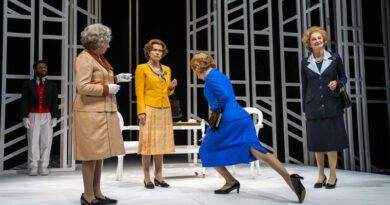“Apex Predator” at Hampstead Theatre
Jane Edwardes in North London
3 April 2025
The dominant image of John Donnelly’s new play Apex Predator is of a woman clutching a not very convincing baby and jigging up and down to make her sleep. Donnelly may be a man, but he writes eloquently about the stresses of being a new mother. The exhaustion. The anxieties. The back pain. And the sense that the world is against you, whether it’s the man talking loudly on his phone, or the neighbour blasting out music in the middle of the night. This is the plight of Sophie Melville’s Mia, trapped in a small flat while her partner Joe (Bryan Dick), who fails to find the right words or actions to comfort her, is free to go out to work at night.

Photo credit: Ellie Kurttz.
But this isn’t simply a domestic drama. Rather, Donnelly has sunk his fangs into the world of vampires, those mythical, blood-sucking creatures so familiar on film, but rarely seen onstage, except in spoofs (such as Dracula, A Comedy of Terrors currently showing at the Menier Chocolate Factory). Donnelly’s attempt to meld the domestic with the outlandish in his 80-minute play (plus an interval) is not entirely successful. The break allows for a climactic end to the first half, but even so it would be better played straight through. Equally, the shifts between humour and horror become increasingly jarring.
The plot is impossible to describe without spoilers. The first hint of strangeness is when Mia and baby Isla visit her young son’s primary school. Alfie (played by Callum Knowelden on press night) is in trouble for biting another boy’s arm in response to being accused of killing the classroom’s gerbil. His new teacher, Ana (Laura Whitmore), is sympathetic, impressed by Alfie’s slightly spooky paintings, but strikes an odd note when she offers to breastfeed the crying baby herself.
The two women become friends. Ana responds to Mia’s latent strength, which has been worn down by her depression. On a rare night out for Mia, the pair end up in the penthouse of a billionaire (multi-roling Leander Deeny), where Ana proves her indestructibility in a spectacular fashion, and a secret bond is forged between the two women
Melville impresses as Mia, and relishes in her caustic wit as well as her intensity. But she’s not helped by Blanche McIntyre’s production, which doesn’t make the most of the play’s spooky, occasionally erotic elements. It’s left to Christopher Shutt’s discordant music to provide a sense of menace along with Jack Knowles’s lighting. Tom Piper’s set effectively traps Mia and Joe’s flat within surrounding scaffolding, together with sliding screens that sometimes seem to suggest that we are getting deeper and deeper into Mia’s anxieties.
It appears that in the world of vampires, there are those who are survivors, who once bitten go on to feed on the blood of others, and those who are simply victims. Mia, Ana, and Alfie are definitely survivors, or rather apex predators. Mia and Ana’s victims are all men. These women who are not to be messed with. But there’s a melancholy about Ana that Whitmore fails to exploit. She has apparently been around for hundreds of years (long enough to have seen Richard Burbage onstage), but is becoming tired of the endless journey and is eager to share it with someone else.
Climate change is a factor, which is difficult to disentangle from the fantastic. Is it that humans are like vampires destroying the planet? Or that the strongest, in this case vampires, are the only ones who will survive when the planet can no longer sustain a growing population?
How seriously are we to take these vampires? To add to the drama, Joe, an IT specialist, is helping the police with a case in which headless bodies are being found in the Thames drained of any blood. He has penetrated chatrooms where supposed vampires talk about the difficulties of getting a passport when you’re several hundred years old. Could Ana be the one he is searching for? Or is it his job that has stirred Mia’s imagination?
Donnelly has focused on screenwriting rather than the stage in recent years, and this feels as if it would make a better film than a play. If we are to take the vampires seriously, either as an expression of Mia’s psyche or of the damage humans are doing to the planet, then the play needs more space to explore this further. And McIntyre’s production needs to be more frightening, more atmospheric, and a good deal more convincing.









